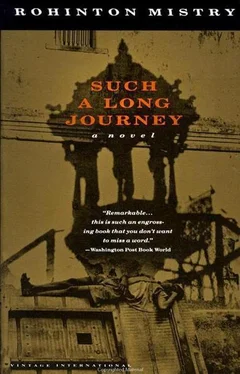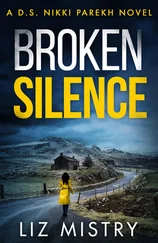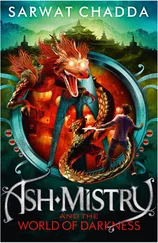Then Malcolm the meat maestro pointed out a most critical point about beef-buying: if the fat had a yellowish tint, it came from a cow, not as desirable as buffalo, whose fat was white. And it was not easy, he said, to distinguish between the two — there was such a variety of gradations, and the light in that huge hall of meat could play tricks, so that very often yellow seemed white. After the first few times, he let Gustad lead the way, to give him practice, he said, practice and more practice, the secret weapon of all virtuosi.
Then Saint Thomas turned to the fishermen and asked, If my God can do it — if He can keep the water from falling back — will you worship Him and forsake your multitude of pagan gods and goddesses, your shoals of idols and deities? And the Hindu holy men whispered amongst themselves, Let us have a little bit of fun, let us humour this Thomasbhai, this crazy foreigner. They said to him, Yes, yes, we will, Thomasji, most definitely.
So Saint Thomas briskly waded out a few feet, cupped his hands, and flung sea-water to the sky. And, lo and behold, it stayed suspended in the air: all of it: the tiny droplets, the big drops, the elongated ones and the round ones, all stood suspended, and refracted the sunlight and sparkled most wondrously, with the perfect glory of the Lord God who created all things. And the crowds gathered on the beach: the fisherfolk, foreign tourists, pilgrims, diplomats, committee chairmen, bankers, mendicants, scally-wags, lazy idle loafers, vagabonds, along with the Hindu holy men, all fell promptly to their knees and asked Saint Thomas to tell them more about his God so they too could worship Him.
The last step (after learning to distinguish between buffalo and cow) involved the ability to identify the choicest sections. Malcolm revealed that the neck portion, which the butchers called neckie, was the tenderest, with the least fat, and quickest to cook, thus saving on fuel bills. Neckie was also the sweetest-tasting, and Malcolm assured Gustad that once he learned to appreciate it, he would never return to mutton, not even if he could afford it some day.
Years later, when Gustad was shopping on his own, he was always willing to share Malcolm’s wisdom with friends and neighbours. He wanted to train them in the art of beef-eating, so they too could give up the expensive mutton habit. No one, however, was as receptive to the idea as he had been with Malcolm. Eventually, Gustad had to abandon all hope of spreading the gospel of beef.
And a time also arrived when Gustad himself shopped no more at Crawford Market, settling instead for whatever stringy bits of goat, cow or buffalo that the door-to-door goaswalla of Khodadad Building brought. By this time, he had lost touch with Malcolm, and was spared embarrassing explanations about the tenuous, tangled connection between his desertion of Crawford Market and the sadhus’ nationwide protest against cow slaughter. It was easier to remain the silent, unknown apostate of beef.
Roshan peered through the cracks in the wickerwork and refused to feed the chicken. She had never seen a live chicken, or even a dead one that had not been cooked. ‘Come on, don’t be frightened,’ said her father. ‘Picture it on your birthday dinner-plate and you won’t be afraid.’ He lifted the basket. Roshan flung the grain and snatched away her hand.
The chicken was used to its new surroundings by now, and pecked busily at the grain, clucking contentedly. Roshan was fascinated by the bird and its movements. She imagined the chicken as her pet. It would be like a dog story in her English Reader. She could take it out in the compound for a walk, holding the bristly coir cord like a leash, or it could perch on her shoulder, like the picture in the Reader of a green parrot with a boy.
She was still dreaming in the kitchen when Darius and Sohrab came to inspect the chicken. Darius put rice on his palm. The chicken ate from his hand.
‘Show-off,’ said Sohrab, stroking its wings.
‘Does the beak hurt?’ asked Roshan.
‘No, just tickles a little,’ Darius answered. Now Roshan wanted to pet it too and reached out gingerly, but the chicken was suddenly nervous again. It flapped its wings, evacuated its bowel and retreated.
‘It did chhee-chhee!’ exclaimed Roshan.
Dilnavaz’s sorely tried patience ran out. ‘See that mess? Everywhere a mess! In the kitchen your silly chicken makes the mess! And in the front room all your books and newspapers, and blackout paper over the windows and ventilators! Dust and dirt and mess everywhere! I am fed up!’
‘Yes, yes, Dilnoo-darling, I know,’ said Gustad. ‘Sohrab and I will make that bookcase one of these days, then all the books and papers will fit nicely. OK, Sohrab?’
‘Sure,’ said Sohrab.
She looked at them. ‘Bookcase is all very fine. But if you think I am going to clean that chhee-chhee, you are making a mistake.’
‘By the time Saturday morning comes, there will be a lot more,’ said Gustad. ‘Don’t worry, I will clean.’ He took it in his stride, but it was a definite miscalculation. In his childhood home there were servants to clean up after the flock.
Sohrab calmed the chicken, holding down its wings, and invited his sister to pet it. ‘Come on, it won’t hurt you.’
‘Look at that,’ said Gustad, very pleased. ‘You would think he has been handling chickens all his life. Look at the expert way he holds it. I’m telling you, our son will do wonderfully at IIT, he will be the best engineer ever to graduate from there.’
Sohrab released the bird. It dashed under the table, its movements making the roughly-braided coir twist come alive, writhe like a thin, fraying snake. ‘Stop it,’ he said to his father, clenching his teeth. ‘How does a chicken have anything to do with engineering?’
Gustad was taken aback. ‘Why are you getting so upset, with just a little joke?’
‘It’s not just a little joke,’ said Sohrab, becoming louder. ‘Ever since the exam results came, you are driving me crazy with your talk of IIT.’
‘Don’t raise your voice at Daddy,’ said Dilnavaz. It was true, she realized, they had been discussing it endlessly, making plans and provisions. How he would live in the student hostel at Powai, and come home at the weekends, or they would visit him with a picnic lunch, the college was so close to the lake and the scene-scenery was so beautiful. And after he had finished IIT he would go to an engineering college in America, maybe MIT, and—. But when this point was reached Dilnavaz would say it was time to stop dreaming and tempting fate, because Sohrab had not even started at IIT as yet.
She understood how he felt. Even so, he could not be allowed to shout. ‘We are feeling very happy about it, what else? Why do you think your father bought the chicken? After hard work all day he went to Crawford Market. With two grown boys in the house, it is a disgrace that he has to do the bajaar. When he was your age he paid his own college fees. And supported his parents.’
Sohrab left the kitchen. Gustad replaced the basket over the fowl. ‘Come, leave it alone now, must not be disturbed all the time.’
Around midnight, Dilnavaz awoke to go to the WC and heard the chicken clucking softly. Must be hungry again, she thought, switching on the light. The faint beseeching sounds made her forget how firmly she had spoken against live chickens. She went to the rice jar and knocked over the copper measuring cup. It hit the floor with a clang that woke the flat. Everyone soon assembled in the kitchen.
‘What happened?’ asked Gustad.
‘I was going to the back, and the chicken made a sound. I thought it was asking for more food,’ she said, holding out her fistful of rice.
Читать дальше












